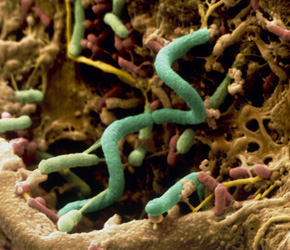

 |
Microbial life contributes to valuable ecosystem services that directly benefit humans. However, there is a general lack of knowlege about these unicellular organisms and, as such, it is difficult to assess their needs. Furthermore, it seems that microbial life is quite self resilient and can thrive without being targeted by conservation efforts. Because of these factors, the problems and solutions pages of our website do not directly address microbes. We include this page on microbial life to acknowlege the importance of prokaryotic species and their role in preserving biodiversity.
Though physically small, microbes play a large role in the functioning of global ecosystems. Due to their size and vast numbers, it has been impossible to measure the size of populations of microbes or even the number of species of microorganisms. However, it is known that diversity in microbe communities is crucial to sustaining larger ecosystem life.
Microbes are important to sustaining life on Earth. Many varieties of microbes function in the nitrogen cycle or as decomposers. Decomposers create and store nutrients necessary for plant growth. Some microbes generate oxygen; others have symbiotic relationships with animals and plants and provide their hosts with nutrients including carbon, nitrogen, and phosphorus. Studies have shown that a reduction in soil microbial diversity reduces plant growth in that soil. For example, one study found that “in soils with experimentally simplified microbial communities, plants were smaller, had reduced chlorophyll content, produced fewer flowers, and were less fecund than plant populations grown in association with more complex soil microbial communities” (Lau and Lennon, 2011). Another study estimates that there are over 20,000 species of plants that would not even be able to exist without microbial asssistance. Because microbes support global ecosystems in so many ways, loss of microbial diversity reduces the overall ability of ecosystems to function (Van der Heijden et al., 2007).
While it is clear that human actions are threatening multicellular organisms,there is currently no evidence that suggests that the level of diversity among microbes is being reduced. Some studies show that microbes are resistant to changes in temperature, pH, and exposure to greenhouse gases and other chemicals (Lamb, 2011). Other studies have found microbes to have incredible adaptive abilities, lessening the likelihood that human causes could wipe out all the microbes that perform a specific function in an ecosystem (Allison & Martiny, 2008).
The knowledge that plants are dependent on microbial diversity indicates the importance of microbes in sustaining ecosystems. But, it is not known which microbial species are crucial or if and how humans are harming them (Lau & Lennon, 2011). Future research could focus on identifying which microbial species are key to sustaining plant and animal life, so that efforts can be made to protect these species from external harm. However, based on the scope of current knowledge, research on microbial biodiversity is likely to take a long time. It is also unlikely that the research will yield results that can be directly applied immediately and have a great impact on the biodiversity crisis at large. Therefore, it is more effective to target solutions to address general biodiversity loss rather than microbial diversity loss. If these efforts are successful, microbial life will remain sufficiently diverse.
As such, our solutions do not specifically address microbial biodiversity. This does not mean that microbial life was not kept in mind when formulating solutions. For instance, the suggested reduction of soil pollution that harms plant life will also likely benefit microbial species affected by the same pollutant. Future actions aimed at preserving biodiversity should consider microbial life, particularly if key species are identified that can be specifically targeted for preservation.